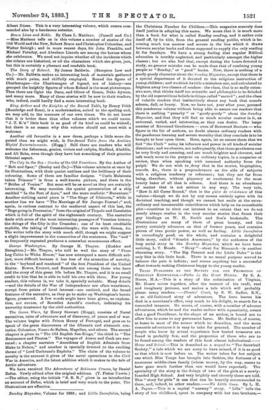Sunday Magazine, Volume for 1883; and Little Snowflakes, being the
Christmas Number for Children.—This magazine scarcely does itself justice in adopting this name. We mean that it is much more than a book for what is called Sunday reading, and it rather outs itself off, by its title, from the general reading public, which is be-
coming much less narrow and severe in the line whioh it draws between secular books and those supposed to supply the only reading fit for Sundays. We have a strong feeling that regular Biblical. educationis terribly neglected, and particularly amongst the higher
classes ; but we also feel that, except during the hours devoted to study, no greater mistake can be made than that of confining young people to "Sunday," or "good" books. Now, there is nothing of a goody-goody character about the Sunday Magazine, except that Marais a special department of it devoted to the religious instruction of
young children; and we think its title a mistaken one, and calculated to frighten away two classes of readers : the class, that is so sadly exten- sive now, that thinks itself too scientific and philosophic to be deluded by the old superstitious beliefs in things called "sacred"; and the class of volatile readers that instinctively shuns any book that sounds solemn, dull, or heavy. Now, we have not, year after year, perused this ponderous volume without being able to assure our readers that
there is nothing " preachy " or "goody-goody" about the Sunday Magazine, and that they will find as much secular matter in it, as
universal, varied, and interesting, as they can desire. The large number of Reverend Gentlemen — even of Reverend Doctors — who figure in the list of authors, no doubt alarms ordinary readers with
the ponderous learning and severe morality that they conclude is to be brought to bear upon them. Here, again, let us assure them that we find "the Cloth" using its influence and power in all kinds of secular
directions; and we observe, not unfrequently, that these gentlemen can be very lively and amusing, and are much brighter and cleverer, and talk much more to the purpose on ordinary topics, in a magazine or review, than when speaking with assumed authority from the pulpit: We do not wish to .deny that in the stories, biographies, travels, Ac., there is a preponderance on the side of subjects with a religious tendency or reference; but they are far from being, therefore, without piquancy or excitement for the most hearty hater of all that is solemn. And there is an abundance
of matter that is not serious in any way. The very tale, "How It All Came Round," that is the piece de resistance of this volume—though we do not by any MORTIS entirely agree with its doctrinal teaching, and though we cannot but smile at the extra- ordinary and innumerable coincidences which help on its remarkable plot—contrives to rivet our interest to an extent that we do not nearly always realise in the very secular stories that flaunt their
gay bindings on W. H. Smith and Son's bookstalls. The illustrations are many of them of great beauty, and the
poetry certainly advances on that of former years, and contains pieces of true poetic power, as well as feeling. Little Snowflakes is exceedingly good, on the whole, and contains a delightful
little story, called "Scarlet Anemones," by the authoress of the
long serial story in the Sunday Magazine, which we have been noticing, L. T. Meade. " Bizzy "—short for Bismarck—is another
charming story. "The Big Peasant and the Little Duke" is the only blot in this little book. There is no moral purpose served to balance the pain it inflicts; and seems anything but a successful effort towards making Christmas happy to the young reader.






































 Previous page
Previous page